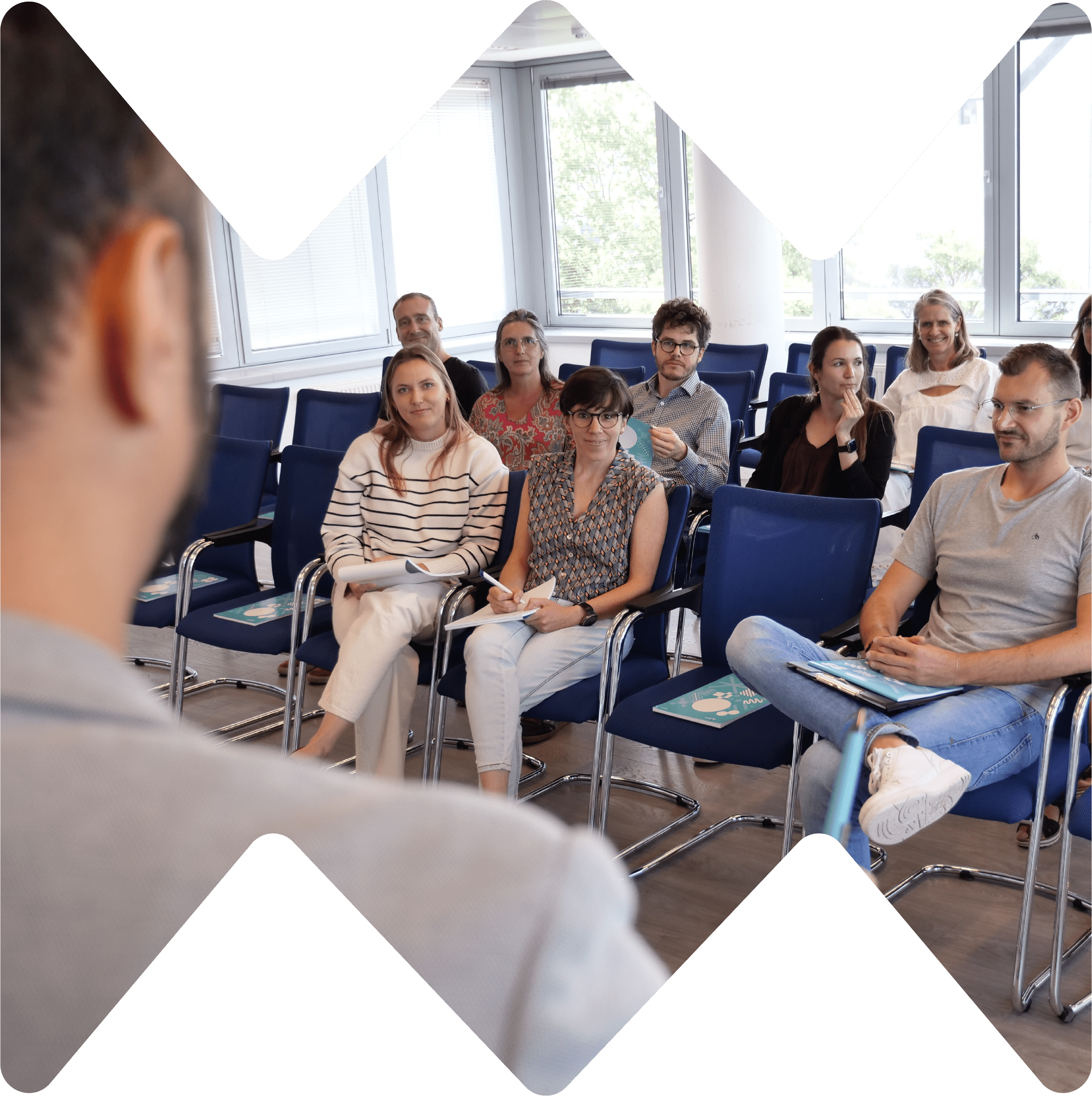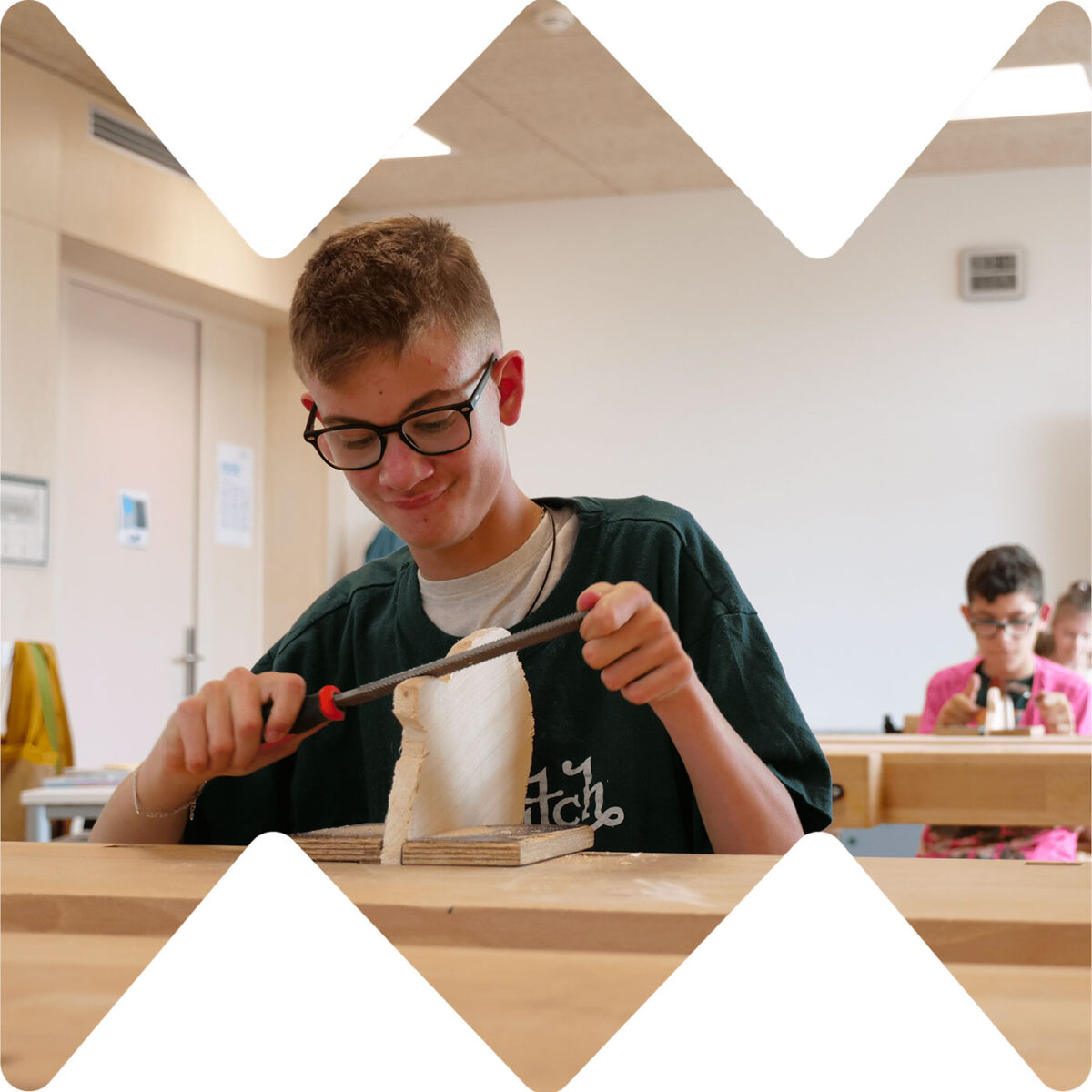For professionals
Regular exchanges with professionals are essential and constitute an important prerequisite for inclusion. Constant advice/guidance and job-shadowing opportunities are offered throughout the school year. Key moments such as the Schuliches Standortgespräch, the provided training sessions, and targeted meetings during the specialized diagnostic process enhance bilateral collaboration to better address the specific needs of the student.
The CDI plays an essential role in promoting the intellectual development of children and youth. By providing specialized advice and tailored support, the center aims to stimulate cognitive development and maximize the intellectual potential of each student. Creating awareness in specialized psycho-pedagogy stands as a fundamental pillar for building educational and caring societies where every student can thrive independently of their specific educational needs.
Professionals working within the CDI implement personalized approaches, offering guidance on best pedagogical practices, learning strategies, and specific interventions to support intellectual development.
The support provided by the center goes beyond mere advice, encompassing careful monitoring to ensure continuous progress:
- Advising teachers and educational and psychosocial staff on medical and social levels by the social workers and qualified nurses of the Social Support and Health Promotion Unit (CASPS) of the CDI.
- Mentoring professionals in the context of specialized care.
- Advising professionals on rehabilitative (psychomotor therapy, speech therapy, and occupational therapy) and therapeutic interventions (music therapy, play therapy, child psychiatric follow-ups, etc.).

We provide a comprehensive training programme, that covers basic teacher training as well as specialized continuing education. Our training courses are designed for CDI staff and other professionals working in the school environment. These courses are organized either by the CDI itself or in collaboration with the IFEN.
Explore our training programs
Based on a specialized diagnosis (Förderdiagnostik), pedagogical teams establish a Förderplanung (support planning) to define the needs of the youth, ensuring maximum participation in education. In close collaboration with parents, they identify areas (Förderbereiche) and set goals in the Individualized Educational Plan. This individualized educational plan undergoes continuous reassessments. Each student creates a portfolio documenting tasks completed and reflecting the skills utilized.
Specialized Interventions
We offer various support options for students aged 3 to 18:
- Ambulatory specialized interventions (ISA) in schools and high schools.
- Specialized schooling in a CDI class or simultaneously and complementarily in a class at a school or high school and within the CDI.
- Specialized rehabilitative interventions in collaboration with the pedagogical team (“Unterrichtsimmanente Förderung”).
Specialized schooling is divided into several cycles:
- Cycles 1 to 4, for children corresponding to the age groups of primary education.
- Cycles 5 to 6, for youths in the age group for secondary education (13-16 years).
- The professional and occupational cycle (PO cycle) for youths aged 16-18 years.
PROFESSIONAL TRAINING FOR ADOLESCENTS
At the end of compulsory schooling, we propose to continue adolescents’ education in the professional and occupational cycle.
The programme focuses on preparing students for working and/or professional life, with an emphasis on acquiring life skills so as to facilitate participation in social life, and also work skills (cross-disciplinary professional skills) that are essential for integration into working life.
Manual and practical activities are gaining significance within the curriculum of the pupils, as they are aimed at preparing them for an adapted work environment (sheltered workshop, day activity centre, first job market).

Every day, psychomotor therapists, occupational therapists, and speech therapists work together to:
- Identify, during the specialized diagnosis, the needs of children/youth to set intervention priorities in collaboration with the involved individuals.
- Take charge of referred children/youth and apply rehabilitation techniques tailored to each individual’s needs.
- Proactively raise awareness among formal and non-formal education stakeholders about the needs of intellectually challenged children/youth.
- Advise teachers, educational and psycho-social staff, and families when dealing with children/youth facing difficulties.
- Participate in national or European commissions, projects, or programs, contribute to the development of specific materials, and provide supervision and training for interns.
Depending on the specific educational needs of children and adolescents and on the re-educational assessment, the team may suggest different types of intervention:
- Individual care
- Group support
- Intervention in classroom teaching
All rehabilitation care is provided in close collaboration with the psycho-pedagogical teams.
The child or adolescents’ motor and communication skills are regularly assessed or reassessed, in order to closely monitor the child/young person’s progress, adapt the goals and, if necessary, determine when the rehabilitation will end.
All interventions in the rehabilitation and therapy unit are carried out in accordance with defined criteria and standards.
Research
and documentation
Research
The CDI is committed to providing quality and innovative education. To ensure this commitment, the CDI establishes partnerships in the field of research, seeks the expertise of specialists in specialized pedagogy, and encourages the participation of collaborators in educational events.
Moreover, the CDI closely collaborates with SCRIPT and attends events organized by MENJE and the University of Luxembourg.
Documentation Center
Our Documentation and Information Center is a resource hub consisting of a library, a play library, and a test library.
Documentation centre
Our Documentation and Information Centre serves as a comprehensive resource hub, encompassing a library, games library, and test library.
Opening hours:
Mon-Fri 9 am -12 pm and 2 pm – 4 pm.
Collaboration
At the CDI, we actively encourage collaboration with partners who specialize in researching new tools, strategies, and actions that promote intellectual development. We value open dialogue and cooperation, striving for effective networking with external partners in line with our commitment to inclusive practices. Please feel free to contact us to explore potential collaboration opportunities.

